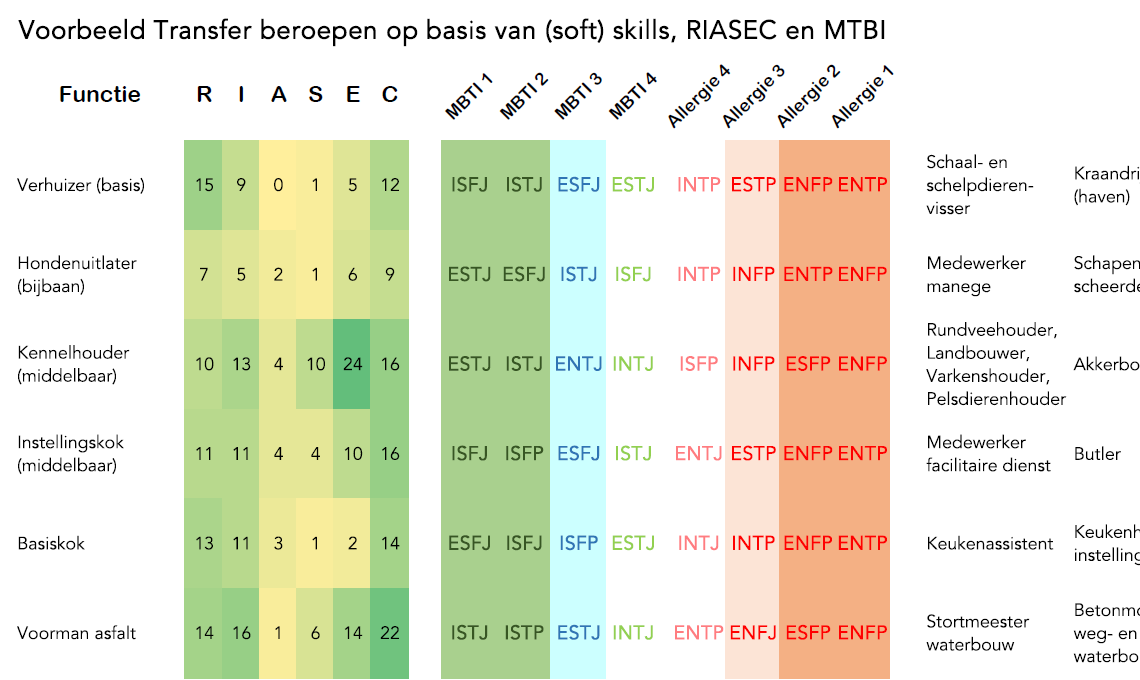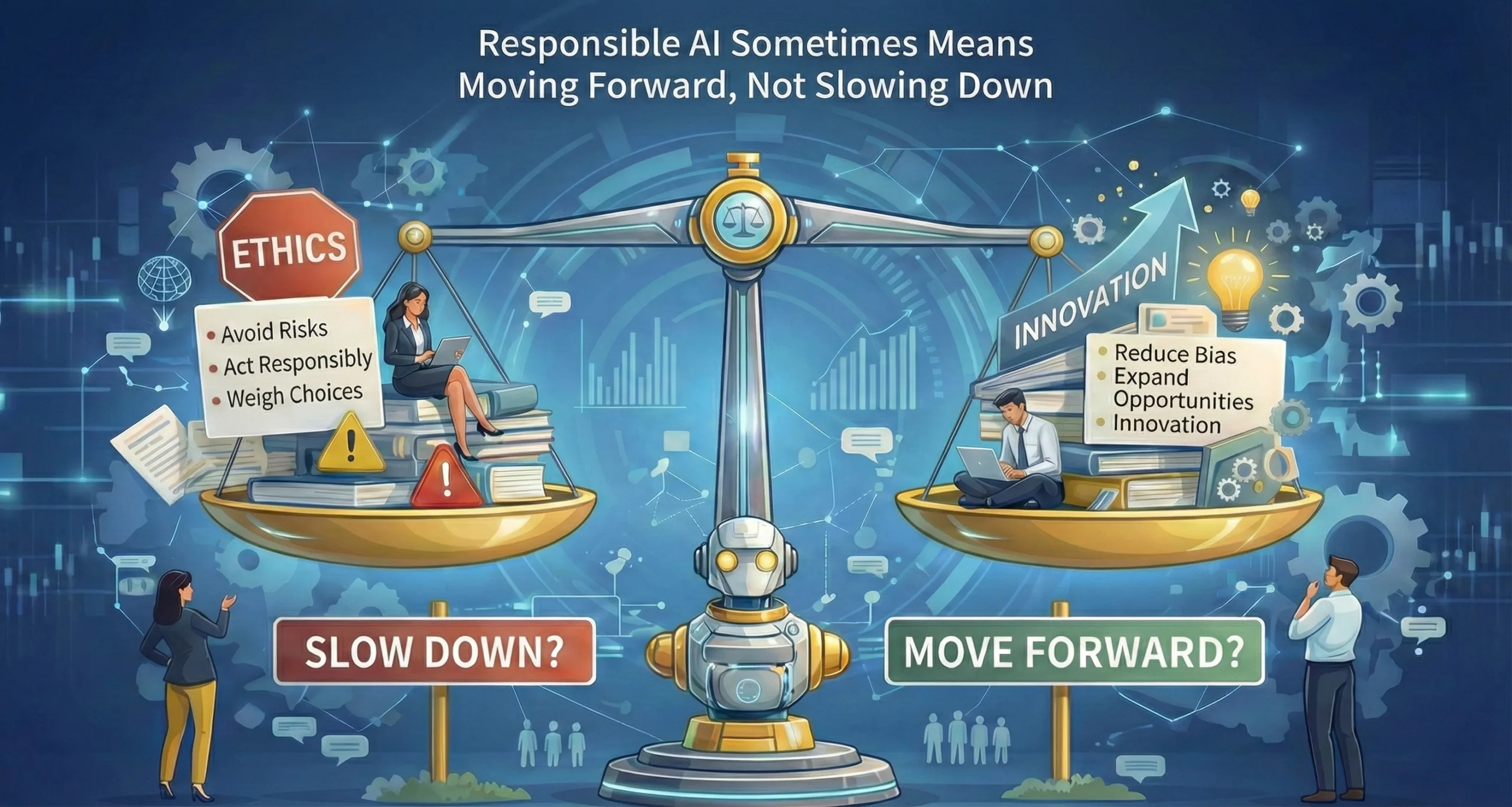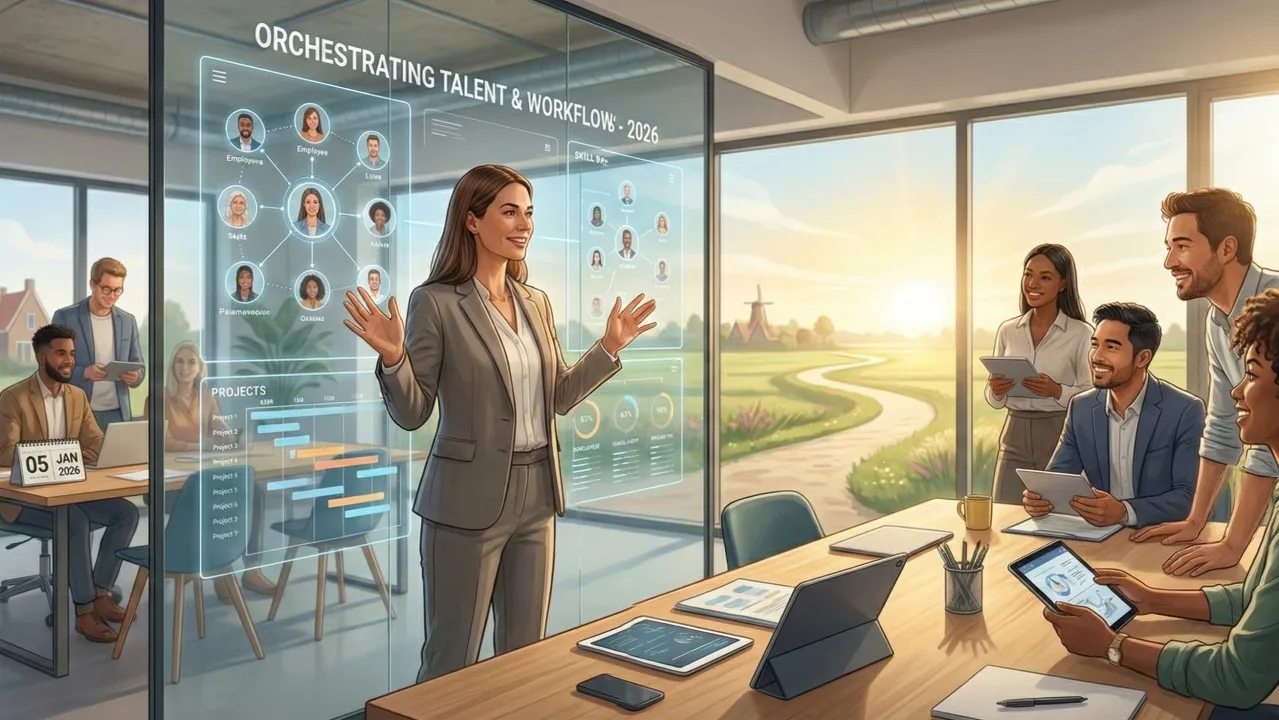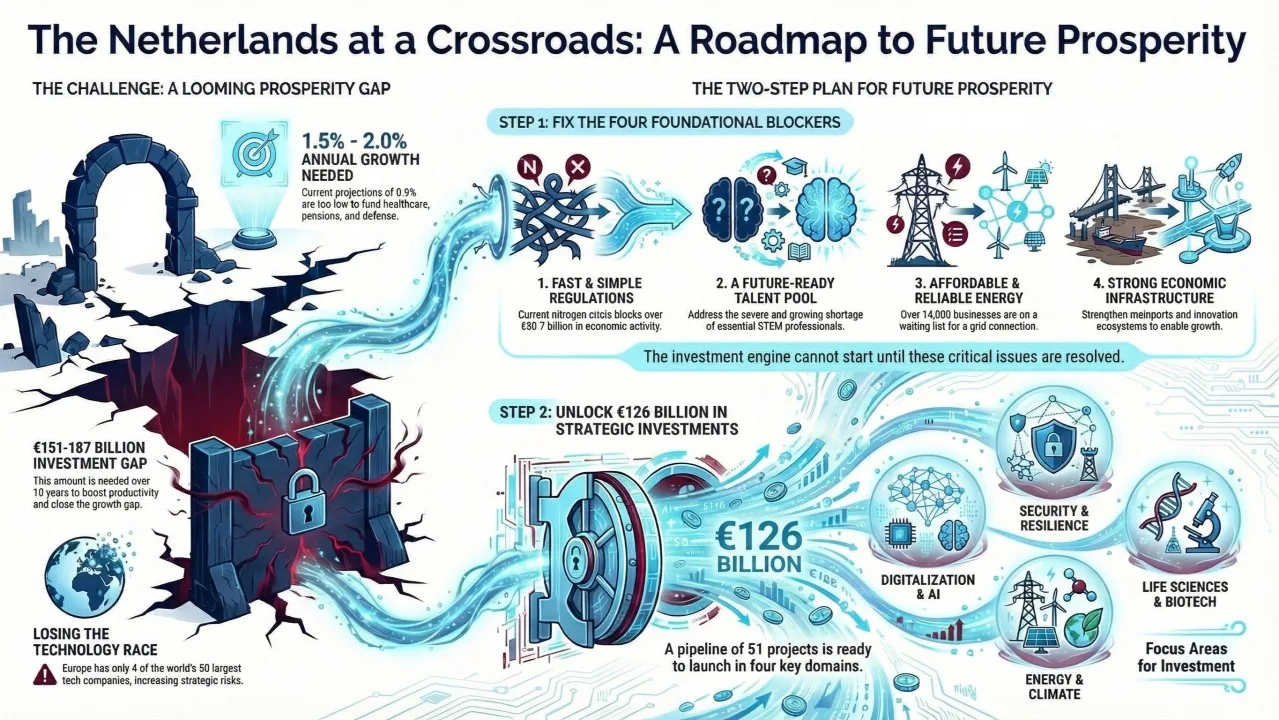A cattle farmer as a mason. A sailor with an aptitude for basic cooking. And a front-end developer who can be deployed on rail infrastructure projects. #AI surprisingly well predicts the (soft) #skills, personalities and ambitions that allow you to switch between occupations. So stop with those assessments, send your recruiter to training and let algorithms do your recruiting. I predict that AI is going to help us tremendously in making sense of stuck and untapped talent. Are you also motivated to put everyone in the right place and curious about how AI can help with this? I’m super curious to hear what you think of this blog! #talentfree
Explanatory text when published on LinkedIn
The inhibiting factor on major ecological and social transitions is the lack of human resources. At least, if you go by the many vacancies and the analyses of labor market economists. What they fail to show, however, is the enormous amount of untapped potential in society. I see this mainly in two groups. First, employees who are “trapped” in a job where they are underperforming. And second, job seekers who are closed off from the labor market, but skills that are perfectly employable task-wise. Then there is a third group who just go to work every day and feel like they are contributing meaningfully, but if you look differently, you will see that they are stuck in ways of working that could be much more effective. Who is going to liberate all this talent and use it meaningfully? Artificial Intelligence!
To realize how AI does that, consider how jobs are made up: of tasks and responsibilities. You need skills (abilities) to perform them. It turns out that there is an extraordinary amount of overlap in tasks among all kinds of occupations. See the figures below from Nedelkoska, Diodato and Nefke (2018). This means that people are much more likely to be suitable for other jobs than they think. Simply because they already have the skills, or can learn them quickly based on generic skills. AI is going to help you figure out what you can (probably) do, what you need for a particular job and how to get there. To make the potential of this clear, I first zoom in on the pointless work and the tasks that could be better done by someone else or AI.

Eliminate bullshit jobs with AI
Earlier I wrote about the growing group of organizations and jobs where their contribution to a more beautiful world is difficult to explain. Unfortunately, for many workers, they are happy with work at all and do not (can not) think about whether their “footprint” is positive or negative for our earth. Then there are the golden cages (or silver or bronze). You earn so much that you ‘lose out’ with a switch and you don’t want to change your standard of living.
Fortunately, these are also the jobs that will soon require far fewer people. Consider, for example, the work of a recruiter: retrieving job postings, writing content, creating campaigns, interviewing candidates, making matches and offers. Mostly “bullshit tasks,” now that employers can instantly see for themselves with smart software who is the best match. Sending personalized invitations or closing contracts goes with a click. AI is also replacing – eventually or not – most software programmers, lawyers, marketing staff and managers though. Much has already been written about how AI recruits better, writes better code, writes better legal reasoning, creates better content and provides better management information. I won’t go further into that here now, and also realize that “socially intelligent” human work will continue to be needed to decide whether or not to deploy what AI suggests.
Identify elsewhere employable hidden skills
What I am getting at with this talk is the ability of AI to point people to their hidden potential. To skills, ambitions and opportunities they were not aware of. If you ask people about what makes them good or happy, they can often only list 20% of the “skills. If you then ask AI what other skills someone with a similar profile has, all sorts of surprising suggestions come up. Click, click, click and your profile is greatly enriched. I am fortunate to work with a R&D team that deals daily with the question, how do we match people and work across the entire (international) labor market. 8vance has now developed and implemented 39 algorithms that collectively predict surprisingly well what you are good at; and where you could work. Chances are you will be surprised by the potential career leap.What I am getting at with this talk is the ability of AI to point people to their hidden potential. To skills, ambitions and opportunities they were not aware of. If you ask people about what makes them good or happy, they can often only list 20% of the “skills. If you then ask AI what other skills someone with a similar profile has, all sorts of surprising suggestions come up. Click, click, click and your profile is greatly enriched. I am fortunate to work with a R&D team that deals daily with the question, how do we match people and work across the entire (international) labor market. 8vance has now developed and implemented 39 algorithms that collectively predict surprisingly well what you are good at; and where you could work. Chances are you will be surprised by the potential career leap.

AI knows your personality and allergies
Using a few examples, let me explain how this works. Suppose you are a mover. Apart from all kinds of other variables you can bring along such as your experience, education and ambition; AI knows that people with this type of profession generally score high on the well-known Holland code personality tests (RIASEC) with 80% certainty on the R and C. They are realistic people, who like practical (outdoor) work, where they have to work with their hands (R). And conventional people with a preference for rules while working (C).
Let’s use another model, such as the Myers-Briggs Type Indicator (MBTI). Then statically, people with this function typically score ISFJ and ISTJ. About this you can read, “The usually quiet ISFJ will do everything possible to fulfill his commitments. In this, this MBTI type proceeds carefully. The ISFJ is very loyal and perceptive. In short, a stable factor in any group.”
Before we start matching these personalities with other occupations, we pull another interesting trick. We look at the lowest scores from test. This, in fact, provides a person’s allergies. It turns out that these are essential in job matching. Above all, don’t do any work that is in your allergy zone! In this case, according to MBTI, “movers” have the “debater” type (ENTP) as their allergy. So you should not ask them to play devil’s advocate. And they should stay away from professions where they have to be especially curious in their search for new knowledge, such as in journalism or law.
Matching on ambition and ‘transferable skills’
In addition to personality, AI can also predict what a person “wants to be later. By analyzing millions of profiles, next career steps can be predicted fairly accurately and correlated to dozens of data points in a profile. The same can be done by AI with skills, a modern word for a person’s areas of knowledge, skills and competencies plus the ability to apply them. AI predicts someone’s hard skills (that often makes pretty good sense: a carpenter can carpenter) and soft skills. The latter is trickier (a cook is often communicative and social), but these skills are more likely to be “transferable” to other occupations. Grid operators such as Alliander cannot find charging station mechanics, but based on the soft skills they find people in a bakery who can also ‘follow protocols’ and ‘work in detail’. They can now write to new target groups and mobilize them into lateral entry.
Alternatives for the mover
Back to the mover. Wondering what AI calculates when we match 63,000 occupations, taking into account personalities, ambitions and transferable skills? Here’s the top 10.
- Animal ambulance driver
- Crane driver (seaport)
- Crustacean and shellfish fisherman
- Shunter
- Co-driver
- Seaman inland navigation, hydraulic engineering
- Forklift driver
- Sailor-engine driver in inland navigation
- Mail deliverer, Postman
- Animal crematorium/animal cemetery employee
What recruiter had come up with these suggestions? And that itself without anyone having to fill out an assessment!

Suggestions for someone with the side job dog walker
Okay. We’ll do 1 more. Suppose you have the side job dog walker. Statistics tells us that then you have a high probability of scoring C, R and E in Holland Code and ESTJ/ESFJ as the highest profiles in MBTI. You have ENFP (Extroverted, Intuitive, Feeling and Perceiving) in your allergy. We ran the test and here are the suggestions:
- Staff member horse-riding school
- Shepherd
- Green space worker (parks and gardens)
- Agricultural seasonal worker
- Cemetery Administrator
- Zookeeper
- Demolisher construction
- Mason
- Loader/unloader rail, road and air freight, Port worker
- Shoemaker, Dockworker
It may seem logical, but you’re not going to tell me that someone had thought of these possibilities on their own. Interested in the top 100 suggestions of AI for your profession? Let me know.

Freeing talent with AI
Which brings me to the essence of this plea. If we start using AI on a large scale to give people suggestions for suitable other work, I am convinced that people will start choosing more fun, educational and meaningful jobs. For work that matters more. Of course, job suggestions are only the first step. You also want to actually see what companies and jobs match in your area, what types of contracts are available and what training opportunities are available to bridge the “gap” to desirable work. We also have a collective challenge to make our social systems more flexible and softer, so that more people dare to quit their contracts and take a leap into other work. We are not there yet, but thanks to AI we can take a big step now!
About me as an author
I am a Chief Evangelist at 8vance, an AI tech company that predicts the match between people and work. My mission is to unlock the hidden capacity in our society. Freeing talent; whether they realize they are stuck or not 😉 . I enjoy pointing out people’s potential on an individual level and coaching them to a breakthrough where they put everything on the line to do the right thing. I enjoy connecting innovators: “You are not alone. If you look differently, you’ll see that the movement you want is already being made.” And finally, I smile in the mirror as I play “crowd-organizer” again; someone who thinks they can orchestrate social change. Obviously naive, but I believe it too. It won’t go according to any preconceived plan; I think I see the direction it will take. I think developments quickly into opportunities and believe I can make a difference with my voice and actions.
Laat je op LinkedIn weten van je deze blog vindt?




Leave a Reply